Supplies and Equipment for Medical Response
Medical Response in Churches
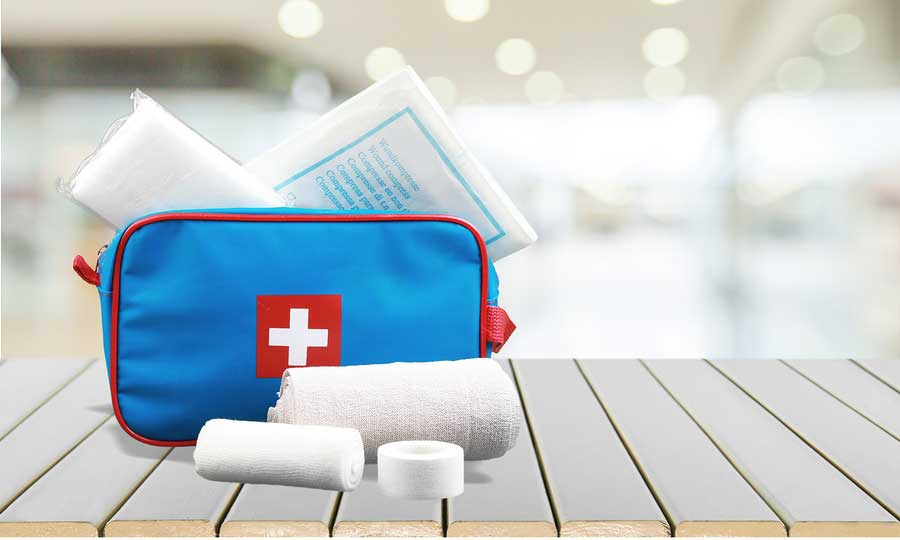
And Isaiah said, “Bring a cake of figs. And let them take and lay it on the boil, that he may recover.” ~ Isaiah 20:7
MIs there no balm in Gilead? ~ Jeremiah 8:22
He went to him and bound up his wounds, pouring on oil and wine. ~ Luke 10:34
No longer drink only water, but use a little wine for the sake of your stomach and your frequent ailments. ~ 1 Timothy 5:23
I counsel you to buy from me ... salve to anoint your eyes, so that you may see. ~ Revelation 3:18
Importance of Being Equipped
A person trained to respond to injuries and medical emergencies may know what to do, but not have what is needed at the time. Some things can be improvised from what is available, and may save a life or limit the extent of damage, but what can be done is limited, and some emergency procedures, such as defibrillation, cannot be performed without the right equipment.
Ancient Medical Supplies and Equipment
- The Bible is not a manual for medical responders, but it does describe or refer to medical care and name a few of the supplies for treating injuries and illnesses:
- Cake of figs for a poultice (2 Kings 20:7; Isaiah 38:21),
- Balm, used as a liniment (Jeremiah 8:22; 51:8),
- Medicine (Jeremiah 30:13),
- Oil and wine for cleansing wounds (Luke 10:34),
- Eye salve (Revelation 3:18),
- Wine (unfermented or lightly fermented) to counteract the effects of bad water (1 Timothy 5:23).
Additionally (as we know from other ancient sources), some kind of dressing was used to bandage cuts. Binding material (cloth or cords) was used to wrap and splint broken limbs. Water-soaked cloth cooled fevers and countered heat exhaustion.
Medical Equipment and Supplies for Church Security
Before deciding what equipment and supplies to get for our Church Safety Team, two questions need to be answered:
(1) How do equipment and supplies differ?
(2) What injuries and medical emergencies are we likely to encounter?
How do equipment and supplies differ?
Equipment is durable - it can be reused. Supplies are expendable - they are used up. For instance, a stethoscope can be used hundreds of times, a bandage only once. Some items may be equipment or supplies, depending a lot on how they are made and used. For instance, scalpels and needles used to be autoclaved (sanitized by heat) and re-used. Now they are disposable to avoid any possibility of contamination by blood-borne pathogens. A flashlight is durable, but the batteries need to be replenished.
What injuries and medical emergencies are we likely to encounter?
- Most injuries to which we respond in the church are accidental:
- Falls and collisions may result in bruises, sprains and fractures.
- Cuts can result from falls, as well as from use of sharp instruments, such as in the kitchen.
- The kitchen is one place where accidental burns are likely.
- People can choke on food while eating. Children can choke on objects they put into their mouths.
Some are or may be intentional:
- Any number of injuries may be inflicted by an attacker, including, among others, stab and gunshot wounds, fractures, and head injuries.
Besides injuries, we may need to respond to medical emergencies:
- Severe allergic reactions may be triggered by certain foods, aromatic substances, and bee stings.
- Diabetic stroke may result from what was eaten or from the insulin level.
- Heat exhaustion/stroke is a hazard in Summer, frostbite in Winter.
- A heart attack or stroke may occur anytime.
- Food poisoning is accidentally caused, but treated as a medical emergency.
Recommended Equipment & Supplies
Items which are available through the Sheepdog Church Security Store[1] on Amazon are noted.
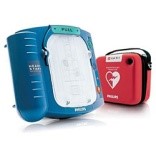 AED - An Automated External Defibrillator is used in response to arterial fibrillation. It monitors the heart to precisely time a pulse to stop and restart the heart. This is equipment which requires training. One available at the SDCS Store is the Philips HeartStart Home Defibrillator[2].
AED - An Automated External Defibrillator is used in response to arterial fibrillation. It monitors the heart to precisely time a pulse to stop and restart the heart. This is equipment which requires training. One available at the SDCS Store is the Philips HeartStart Home Defibrillator[2].
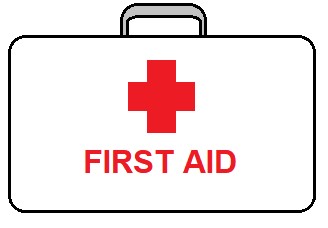 Medical/First Aid Kits - This is the basic supply resource for a "Code Blue" response. It should have the supplies you will need in an emergency. Several are available, both online and in stores. But this is not your home & travel First Aid kit. It should meet the needs of an institution, such as a church. Brotherhood Mutual, a church insurance company, says,
Medical/First Aid Kits - This is the basic supply resource for a "Code Blue" response. It should have the supplies you will need in an emergency. Several are available, both online and in stores. But this is not your home & travel First Aid kit. It should meet the needs of an institution, such as a church. Brotherhood Mutual, a church insurance company, says,
". . . churches should stock first-aid kits, Edmonds said. He recommends not buying them from the local department store. Instead, you should purchase an institutional first-aid kit, which is larger and more comprehensive. Contact a professional first-aid kit supplier, such as Afassco, Zee Medical, or Cintas, for assistance. Also buy a CPR kit, which includes protective airway masks to help prevent mouth-to-mouth contamination."[3]
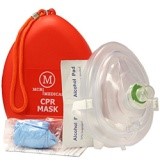 Pocket CPR Masks - CPR masks protect both the responder and the subject in the mouth-breathing portion of cardiopulmonary resuscitation. Considering the cost, it would be tempting to try to clean and re-use. At the very least, the filter should be changed. However, effective cleaning of the mask itself is not guaranteed, so it is advisable to use a new CPR mask for the next person. Available at the SDCS Store is the MCR Medical CPR Rescue Mask, Adult/Child Pocket Resuscitator, Hard Case with Wrist Strap.[4]
Pocket CPR Masks - CPR masks protect both the responder and the subject in the mouth-breathing portion of cardiopulmonary resuscitation. Considering the cost, it would be tempting to try to clean and re-use. At the very least, the filter should be changed. However, effective cleaning of the mask itself is not guaranteed, so it is advisable to use a new CPR mask for the next person. Available at the SDCS Store is the MCR Medical CPR Rescue Mask, Adult/Child Pocket Resuscitator, Hard Case with Wrist Strap.[4]
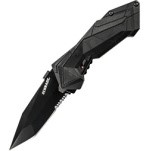 Pocket Knife or Multi-Tool - This is the be-all, do-all, fix-it-all tool for all kinds of handy-dandies (a.k.a. "handypersons"). The two best-known brands are Leatherman and the Victorinox Swiss Army Knife. There are other quality brands too, such as Gerber, and RAVpower.
Pocket Knife or Multi-Tool - This is the be-all, do-all, fix-it-all tool for all kinds of handy-dandies (a.k.a. "handypersons"). The two best-known brands are Leatherman and the Victorinox Swiss Army Knife. There are other quality brands too, such as Gerber, and RAVpower.
Another type of multi-tool is the tactical pen, which not only writes, but has tools included, which may include flashlight, glass breaker, and a cutter. In a "Code Blue" situation, these can cut restraints (such as a seat belt), open a supply packet, break the window of a wrecked car, etc.
A pocket knife can also be used in rescues and treating injuries. A Schrade tactical knife is available on the SDCS Amazon Store.[5]
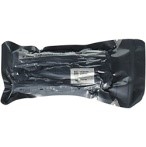 ResQMe Life-Saving Tool - This can break into a car to rescue an occupant.
ResQMe Life-Saving Tool - This can break into a car to rescue an occupant.
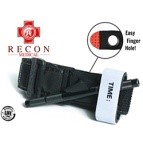 Compression Bandages - In the second article in this series - Stanch the Flow - we dealt with how to stop bleeding. The first means is compression of the cut. Compression bandages are made expressly for this function. The Israeli Bandage Battle Dressing First Aid Compression Bandage can be found on the SDCS Store.[6]
Compression Bandages - In the second article in this series - Stanch the Flow - we dealt with how to stop bleeding. The first means is compression of the cut. Compression bandages are made expressly for this function. The Israeli Bandage Battle Dressing First Aid Compression Bandage can be found on the SDCS Store.[6]
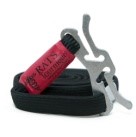 Tourniquet - Tourniquets of one kind or another have been used since ancient times to stop bleeding by pinching off the supply of blood to a wound. Many items can be used for a tourniquet, but ready-made ones are available, such as the Recon Medical BLK-1PAK-FBA Tourniquet[7] and the RATS Rapid Application Tourniquet System[8].
Tourniquet - Tourniquets of one kind or another have been used since ancient times to stop bleeding by pinching off the supply of blood to a wound. Many items can be used for a tourniquet, but ready-made ones are available, such as the Recon Medical BLK-1PAK-FBA Tourniquet[7] and the RATS Rapid Application Tourniquet System[8].
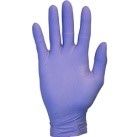 Disposable Gloves - This is a first-line defense against contamination of open wounds and contact with body fluids (such as blood). Latex gloves have long been used, but some persons have latex allergies, so other materials are generally used for prophylactic gloves. The two most common are vinyl and nitrile. The SDCS Store has Nitrile Exam Gloves that are medical grade, powder free, latex rubber free, and disposable.[9]
Disposable Gloves - This is a first-line defense against contamination of open wounds and contact with body fluids (such as blood). Latex gloves have long been used, but some persons have latex allergies, so other materials are generally used for prophylactic gloves. The two most common are vinyl and nitrile. The SDCS Store has Nitrile Exam Gloves that are medical grade, powder free, latex rubber free, and disposable.[9]
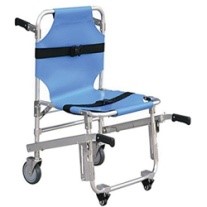 Medical Transport Chair - For some injuries and medical emergencies, the patient cannot walk, but can be moved. In these situations, a wheelchair is useful. Even better is a transport chair designed for firefighters and EMTs, such as the LINE2design EMS Stair Chair 4-Wheels - Ambulance Firefighter Evacuation Medical Transport Chair With Quick Release Buckles.[10]
Medical Transport Chair - For some injuries and medical emergencies, the patient cannot walk, but can be moved. In these situations, a wheelchair is useful. Even better is a transport chair designed for firefighters and EMTs, such as the LINE2design EMS Stair Chair 4-Wheels - Ambulance Firefighter Evacuation Medical Transport Chair With Quick Release Buckles.[10]
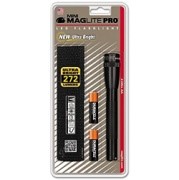 Pocket Flashlight - A pocket flashlight, such as the Maglite Mini PRO LED[11], is useful in examining an injured or ill person. In a lights-out situation, it can locate needed items and illuminate your work.
Pocket Flashlight - A pocket flashlight, such as the Maglite Mini PRO LED[11], is useful in examining an injured or ill person. In a lights-out situation, it can locate needed items and illuminate your work.
Other recommended items include:
- Cleansing tools and agents - alcohol, gauze and cotton, swabs, soap, anti-microbial wipes, eye wash, hydrogen peroxide, etc.
- Thermometer
- Bandaging materials, including tape
- Elastic - "Ace" - bandages
- Arm slings, splints
- Scissors
- Tweezers
- Large flashlight
- Blankets
- Antibiotic, burn, and hydrocortisone ointments
- Pain relievers and antacids
- Epinephrine injections and Benadryl (or generic) for severe allergy response
- Instant cold and instant heat compresses
Stay Fresh
To always be ready, check the medical supplies frequently. Refill items which have been used, replace any which are date expired.
Resources
Sheepdog Church Security Online Training https://sheepdog-church-security.thinkific.com/collections
- Church Safety and Security Volunteer Academy https://sheepdog-church-security.thinkific.com/courses/church-safety-and-security-volunteer-academy
Hear Kris and Ron discuss this topic on the Church Security Roll Call podcast https://soundcloud.com/churchsecurityrollcall. At the end of the podcast is the key to this month's special resource.




